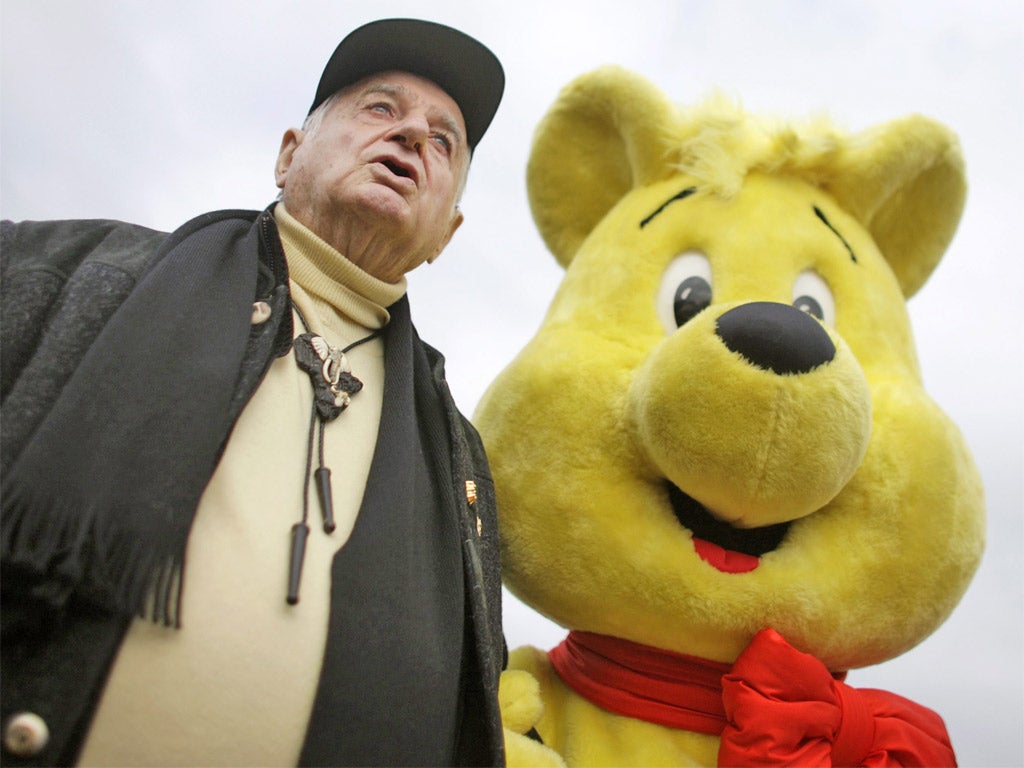Hans Riegel: Businessman who transformed Haribo into a global confectionery giant

Hans Riegel was the co-owner of the global German sweets giant Haribo, famed for its gum and jellied treats, its happy cola bottles, milk bottles, hearts, liquorice, dummies, and above all the gummi bear – brightly coloured, chewy teddy-bear shapes.
With his younger brother Paul – and reminiscent of Karl and Theo Albrecht (also from the Rhineland area), co-founders of Aldi – the Riegels were from the old school of German capitalism: hard-working, responsible, persistent and full of business acumen. Paul was responsible for production until his death in 2009, while Hans handled distribution, sales and marketing.
The pair transformed a failing postwar confectionery business with 30 employees, 10 sacks of sugar and the secret recipe for gummi bears into a worldwide empire employing over 6,000 across 15 production sites in 10 European countries and beyond, with an estimated €2 billion in annual sales in 110 countries. A new £92m factory is due to open in Castleford, West Yorkshire to help meet demand.
Hans was credited with inventing more than 200 sweets, including Vademecum sugar-free gum, Maoam fruit chewies and liquorice whips. He said he derived his inspiration from reading children's comics, books and magazines, as well as watching children's films. "I love children," he said. "They are my customers. I have to be informed about what they want to nibble, what they think, what language they speak."
In the mid-1960s Riegel tweaked the already famous ditty, "Haribo macht Kinder froh" ("Haribo makes children happy") and expanded it to include the phrase "und Erwachsene ebenso" ("and adults too"). This new slogan worked well, marking the ever-widening fan base for Haribo products. The English version, which worked in the rhyming of the original, was translated to become "Kids and Grown-ups love it so, the Happy World of Haribo". In March this year Forbes estimated that Riegel had a net worth of nearly $2.9 billion (£2.4bn) and that Haribo had been growing despite widespread economic malaise.
Born in Bonn in 1924, Hans was the son of Hans and Gertrud Riegel. In 1920, Hans Snr acquired a house in Kessenich, a surburb of Bonn and with little more than a sack of sugar, a stove, a copper kettle and a roller, established Haribo - "HAns RIegel BOnn." Gertrud was the first employee. In 1922, Riegel invented the "dancing bear", made out of fruit gum, that laid the foundations for Haribo's later success.
Hans Snr died in 1945 and immediately after the Second World War Gertrud kept the business going although raw materials were scarce. Returning to Bonn, having been a prisoner of war, Hans took over the family firm with Paul. The company began to flourish and came to epitomise Germany's hugely successful Mittelstand – the small firms that make up the backbone of the economy in German-speaking countries. Within five years Haribo was employing more than 1,000 people and riding the crest of the Wirtschaftswunder, or "economic miracle".
In 1960 the dancing bears, inspired by the performing brown bears that used to appear at circuses and fêtes, were replaced by the first golden bears. Nowadays 100 million are produced every day. The late 1970s saw the bears undergo a make-over, the results of which are still in place today.
Riegel recognised how important the new medium of television could be and in 1962 the first Haribo commercials were broadcast in Germany. They were an instant success and Riegel went on to invest heavily in them. Over the next three decades Haribo expanded, acquiring businesses in the Netherlands, France, Italy and the UK and establishing sales offices across Europe, including the largest European market, Russia.
Viewed as a slightly eccentric boss, Riegel was a tenacious entrepreneur, a workaholic and bon viveur who maintained strong relationships with his employees, whose treatment ensured their loyalty. He also kept a close eye on his executives, monitoring what was happening within the company.
In 2000 Haribo was criticised for refusing to contribute to a fund set up by the German government and businesses to compensate forced labourers during the Nazi period. The company insisted that there was no evidence that it had ever benefited from forced labour.
Riegel, who was divorced with no children, remained a co-owner of the company with a 50 per cent stake, and was actively involved in marketing until the end of his life. The remaining 50 per cent is owned by Paul's three sons; Hans Guido heads the production and technical department while Hans Jürgen and Hans Arndt sit on the supervisory board.
In 1987, Riegel established the Hans Riegel Foundation, which awards annual scholarships to students at 12 German universities, including his alma mater, Bonn, where he completed his doctorate in Economics in 1951; his thesis was entitled "The development of the world sugar economy during and after the Second World".
In 1994 Riegel was awarded Germany's highest honour, The Order of Merit of the Federal Republic, not only for his business career but also for his philanthropy and commitment to social issues such as his encouragement of the training of talented young people. He promoted badminton, a personal passion, having won Germany's first men's doubles championship. He also had a passion for helicopters and for hunting deer on his 4,800 hectare property in Austria's Steiermark region.
A few years later he received the Golden Order of Merit for services rendered to the Republic of Austria. Riegel, who had been recovering from an operation to remove a benign brain tumour in July, died of heart failure.
Martin Childs
Hans Riegel, businessman and philanthropist; born Bonn 10 March 1923; married (marriage dissolved); died Bonn 15 October 2013.
Subscribe to Independent Premium to bookmark this article
Want to bookmark your favourite articles and stories to read or reference later? Start your Independent Premium subscription today.

Join our commenting forum
Join thought-provoking conversations, follow other Independent readers and see their replies